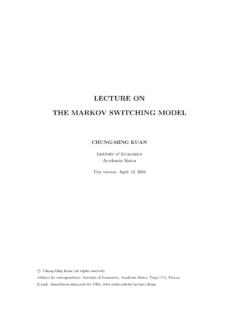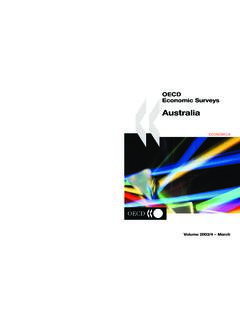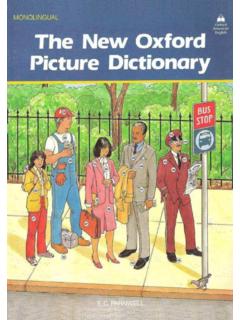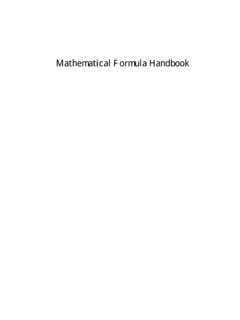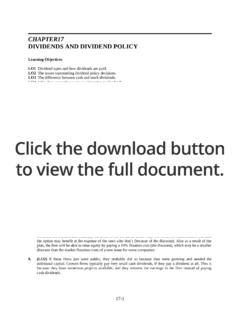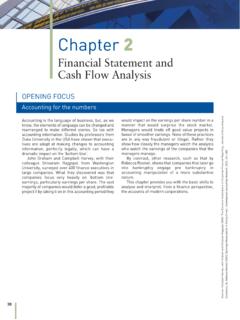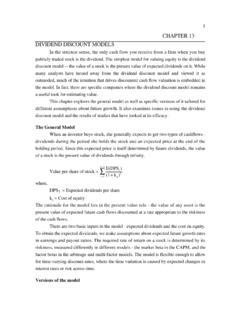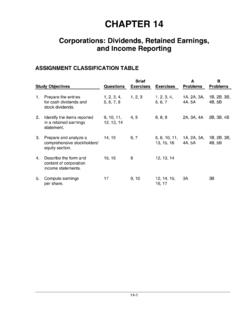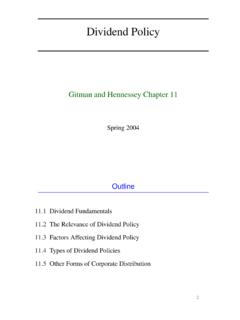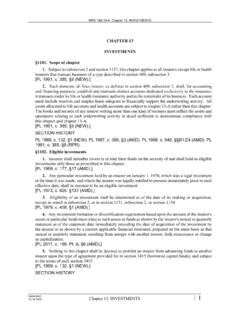Transcription of Chapter 16 Payout Policy - 國立臺灣大學
1 Test Bank, Chapter 16 168 Chapter 16 Payout Policy Multiple Choice Questions 1. Firms can pay out cash to their shareholders in the following ways: (I) Dividends (II) Share repurchases (III) Interest payments A) I only B) II only C) III only D) I and II only Answer: D Type: Easy Page: 415 2. Dividends are decided by: (I) The managers of a firm (II) The government (III) The board of directors A) I only B) II only C) III only D) I and II only Answer: C Type: Easy Page: 416 3.
2 Which of the following dividends is never in the form of cash? (I) Regular dividend (II) Special dividend (III) Stock dividend (IV) Liquidating dividend A) I only B) II only C) III only D) I, II, and IV only Answer: C Type: Easy Page: 417 Brealey/Myers/Allen, Principles of Corporate Finance, 8/e 1694. Firms can repurchase shares in the following ways: (I) Open market repurchase (II) Through a tender offer (III) Through a Dutch auction process (IV) Through direct negotiation with a major shareholder A) I only B) II only C) III only D) I, II, III, and IV Answer: D Type: Medium Page: 417 5.
3 The par value of the outstanding shares is defined as: A) Retained earnings B) Legal capital C) Book value of equity D) None of the above Answer: B Type: Medium Page: 417 6. Which of these dates occurs last in time (when arranged in the chronological order)? A) Payment date B) Ex- dividend date C) Record date D) dividend declaration date Answer: A Type: Easy Page: 417 7. Which of the following lists events in the chronological order from earliest to latest?
4 A) Record date, declaration date, ex- dividend date B) Declaration date, record date, ex- dividend date C) Declaration date, ex- dividend date, record date D) None of the above Answer: C Type: Medium Page: 417 8. The procedure where the firm states a series of prices at which it is prepared to repurchase stock. Shareholders submit offers indicting how many shares they wish to sell at each price. The firm then calculates the lowest price at which it is able to buy the desired number of shares. This procedure is known as: A) Open market transaction B) Dutch auction C) Green mail D) None of the above Answer: C Type: Medium Page: 417 Test Bank, Chapter 16 170 9.
5 The most important difference between stock repurchases and cash dividends is that they (I) Benefit different groups (II) Have different effects on corporate cash flow (III) May have different tax consequences A) I only B) II only C) III only D) I, II, and III Answer: B Type: Difficult Page: 417 10. Greenmail refers to the practice of a company purchasing its stock from: A) Small shareholders who are unhappy with performance of the firm B) A hostile shareholder who threatens to take over the firm C) Large shareholders who are unhappy with performance of the firm D) None of the above Answer: B Type: Medium Page: 417 11.
6 Which of the following is not true? A) Firms have long-run target dividend Payout ratios B) dividend changes follows shifts in long-term, sustainable earnings C) Managers are reluctant to make dividend changes that might have to be reversed D) All of the above Answer: D Type: Medium Page: 418 12. Generally, firms resort to repurchase of stock because: (I) Firms have accumulated large amount of excess cash (II) Firms want to change their capital structure (III) Firms want to substitute it for regular dividends A) I only B) II only C) I and II only D) III only Answer: C Type: Medium Page: 418 13.
7 Generally, the announcement of an increase in dividends is interpreted by the investors as: A) Bad news and the stock price drops B) Good news and the stock price increases C) A non-event and does not affect the stock price Answer: B Type: Easy Page: 420 14. Generally, a reduction in dividend is interpreted by investors as: A) Bad news and the stock price drops B) Good news and the stock price increases C) A non-event and does not affect the stock prices Answer: A Type: Easy Page: 420 Brealey/Myers/Allen, Principles of Corporate Finance, 8/e 17115.
8 One key assumption of the Miller and Modigliani dividend irrelevance argument is that: A) Future stock prices are certain B) There are no capital gains taxes C) All investments are risk-free D) New shares are sold at a fair price Answer: D Type: Medium Page: 422 16. The indifference proposition regarding dividend Policy : A) Assumes that tax rates increase at the same rate as inflation B) Assumes that investors are indifferent about the timing of dividend payments C) States that investors are indifferent between stock dividends and cash dividends D) States that investors are indifferent between stock repurchase and cash dividends Answer: B Type: Medium Page: 422 17.
9 One key assumption of the Miller and Modigliani dividend irrelevance is that: A) Future stock prices are certain B) There are no capital gains taxes C) Capital markets are efficient D) All investments are risk-free Answer: C Type: Medium Page: 422 18. The dividend -irrelevance proposition of Miller and Modigliani depends on the following relationship between investment Policy and dividend Policy . A) The level of investment does not influence or matter to the dividend decision B) Once the dividend Policy is set the investment decision can be made as desired C) The investment Policy is set before the dividend decision and not changed by dividend Policy D) None of the above Answer: C Type: Medium Page: 425 19.
10 Company X has 100 shares outstanding. It earns $1,000 per year and expects to pay all of it as dividends. If the firm expects to maintain this dividend forever, calculate the stock price today. (the required rate of return is 10%) A) $110 B) $ 90 C) $100 D) None of the above Answer: C Type: Easy Page: 425 Response: Dividends = 1000/100 =$10 ; P = 10 =$100 Test Bank, Chapter 16 172 20. Company X has 100 shares outstanding. It earns $1,000 per year and expects to pay all of it as dividends. If the firm expects to maintain this dividend forever, calculate the stock price after the dividend payment.


